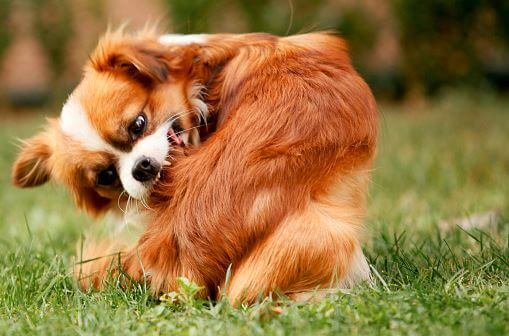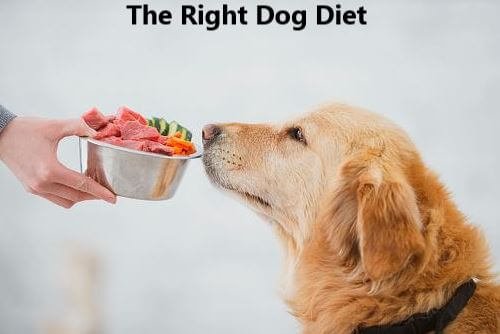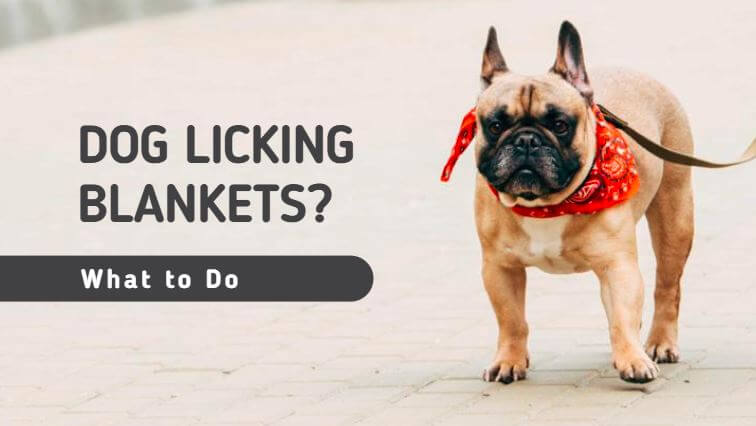Many people have been asking us this question, “Why do dogs lick blankets?” It’s a behavior that is often puzzling to pet owners. We had to study this behavior and fortunately, we found a scientific explanation for it as is elaborated below.
Dogs lick blankets due to medical reasons or learned behaviors. The most common medical reasons why dogs lick blankets include adrenal conditions, gastrointestinal problems, itchy skin, or dental issues. Obsessive-compulsive behavior is the most likely learned behavior why your dog licks blankets.
In the rest of this article, we dive into answering the question, “Why do dogs lick blankets?” You’ll know the reasons in detail and how to prevent the annoying behavior. Keep reading!
Why Do Dogs Lick Blankets? The Main Reasons and What to Do
Most dog owners ask the following questions when their pet dogs lick blankets, furniture, and carpets:
- Is my dog lacking some nutrients?
- Is this a bad behavior that should be stopped?
- What are the health risks associated with this behavior?
When you see your dog lick blankets or furniture, it’s important to take note of the context in which this behavior is occurring. For example, if your dog only licks blankets when he’s left alone, it’s likely that he’s doing it out of boredom or anxiety.
On the other hand, if the dog licks blankets when you’re petting him, it could be a sign that he enjoys physical contact and is seeking more of it.
Let’s now dive into the main reasons dogs lick blankets and pillows.
1. Itchy Skin Due to Allergies

Dogs may lick their skin obsessively if they are allergic to something in their environment. Allergies cause intense itchiness, and dogs will often lick the affected area in an attempt to relieve the discomfort. This is why you must choose the right dog breed for your home.
The common dog allergens include:
- Pollen
- Mold
- Dust mites and pollen
- Cigarette smoke
- Dander (flakes of dead skin)
- Food ingredients
- Chemicals in shampoo and flea collars
When a dog that’s allergic to something comes into contact with it, she may be forced to lick the skin. What the licking does to the skin is that it makes the itchiness worse. The saliva from licking further irritates the skin and causes more inflammation. To counter this, the dog resorts to licking blankets, furniture, or anything in her vicinity.
2. Lack of Essential Nutrients
Like human beings, dogs need a balanced diet to maintain their health. A lack of certain nutrients leads to various health problems in dogs, including skin and joint disorders.
The table below shows the essential nutrients you should feed your dog:
| Nutrient | Types | Quantity For an Adult Dog |
| Fats | -Linoleic acid -Omega-6 -Omega-3 | 5.5% of its daily calories |
| Proteins | -Amino acids | 1 gram per pound of its body weight |
| Carbohydrates | -Sugars -Starches -Fiber | Up to 50% of its daily diet |
| Vitamins and Minerals | -Vitamin A -Vitamin D -Vitamin E -Vitamin K -B-complex vitamins -Phosphorus -Calcium | 5000 IU/Kg |
When a dog fails to get these essential nutrients, she may start to lick obsessively in an attempt to make up for the deficiency. This is often seen in dogs that are fed a diet of low-quality kibble or table scraps.
Blankets and furniture provide a different texture for the dog to lick, which may be satisfying for her. In some cases, the licking behavior may persist even after the deficiency has been corrected with a change in diet.
It’s worth noting that water is an essential necessity for the survival of your dog. If you want her satisfied and avoid licking blankets, give her enough water. Dogs lose a lot of water in summer as they pant to cool their bodies. This is the time your dog needs a consistent supply of water.
How to Choose a Nutritious Food for Your Dog

You want your dog to be healthy, cheerful, and have a beautiful coat, so you’re probably wondering what kind of food to feed him. The good news is that there are plenty of nutritious options available for your furry friend.
The best way to choose nutritious food for your dog is by consulting your vet or dog behaviorist. The vet will examine your dog and recommend a diet that is tailored to his specific needs.
You should also avoid feeding your dog table scraps, as this can lead to nutritional deficiencies. Table scraps are often lacking in the essential nutrients like vitamins, minerals, and fiber that your dog needs to stay healthy.
When choosing food for your dog, make sure to adhere to the following general guidelines:
- Age-appropriate: Dogs have different nutritional needs at different life stages. For example, puppies need food that is high in calories and proteins to support their rapid growth.
- Size-appropriate: Small dogs have a higher mass-specific metabolic rate and require more calories per pound than large dogs.
- Breed-appropriate: Some breeds are predisposed to certain health conditions, such as hip dysplasia. Your vet can recommend a diet that is tailored to your dog’s breed.
“To make sure the dog food you buy has the right mix of nutrients, look for the words ‘complete and balanced nutrition’ on the label.”
WebMD.
3. Obsessive-Compulsive Disorder
Obsessive-Compulsive Disorder (OCD) or Canine Compulsive Disorder (CCD) in dogs is diagnosed through normal dog behaviors that have become excessive and are now interfering with the dog’s quality of life. It’s an irresistible urge by dogs to do something.
For example, a dog who excessively licks his paws may be doing so because he has an itch. However, if the dog experiences excessive licking that interferes with her ability to walk or play, it may be due to a compulsive habit.
Compulsive behavior may be motivated by a desire to reduce separation anxiety or to achieve perfectionism. The disorder is often seen in high-stress environments, such as shelters or homes with multiple dogs.
Dogs with OCD resort to licking blankets, carpets, and furniture as a way to cope with their anxiety. The licking provides a sense of calm and relief for the dog.
How to Treat OCD in Dogs
If you suspect that your dog has OCD, consult your vet. The vet will rule out any medical reasons that may be causing the excessive dog lick behavior. In most cases, veterinarians prescribe serotonin reuptake inhibitors (SSRI’s) such as fluoxetine (Prozac) to treat OCD in dogs.
In some cases, behavior modification may also be necessary. For example, if your dog is licking carpets excessively, you may need to provide him with an alternate chew toy or place a rug over the area he is licking.
The following behavioral and environmental changes are also recommended to manage OCD in dogs:
- Reducing stress in the dog’s environment by providing her with a quiet place to rest, such as a crate or bed.
- Enrolling your dog in an obedience class or dog training program to provide her with structure and positive reinforcement.
- Exercising your dog regularly to tire her out both mentally and physically.
- Provide your dog with plenty of chew toys, bones, and other objects to keep her occupied.
4. Digestion Complications
One of the most common reasons why dogs lick things is because they are experiencing digestion complications. Dogs may lick their blankets as a way to soothe their upset stomachs.
Dogs have sensitive digestive systems and can often develop stomach problems, such as gastritis or pancreatitis. These conditions can be extremely painful and may cause vomiting, diarrhea, and loss of appetite.
In case of stomach complications, dogs may also lick their blankets as a way to stimulate vomiting when they have ingested something poisonous.
It’s not always true that when a dog experiences stomach complications, she has taken something poisonous. Many dogs are intolerant to certain foods, such as wheat or corn. These ingredients can cause stomach upset, vomiting, and diarrhea. You should prioritize non-GMO food.
In such a situation, you may notice yellow balls in the dog’s poop. A condition that calls for further diagnosis.
Dogs may also lick their blankets as a way to relieve constipation. When a dog is constipated, she may strain to defecate and may even vomit. The act of licking her blanket may help to stimulate her bowel movements.
If your dog is experiencing any of these symptoms, it’s important to take her to the vet as soon as possible.
If your dog is licking his blanket excessively and seems to be in pain, consult your vet. The vet will diagnose the dog and if the problem is caused by diet, he or she will recommend the most appropriate diet for your dog.
How to Change Your Dog’s Diet
If it’s established that diet is the primary cause of your dog’s complications that leads to the licking of blankets and furniture, you will have to change it. However, the change must be done gradually. You should:
- Start by mixing a small amount of the new food with your dog’s old food.
- Every day, increase the amount of new food while decreasing the amount of old food.
- After a week or so, your dog should be eating solely the new food.
It’s important to make sure that you are feeding your dog the appropriate amount of food. Overfeeding can lead to obesity, which will cause a whole host of health problems like diabetes, joint pain, and respiratory difficulties.
5. Pica
Pica is a condition that causes dogs to compulsively eat non-food items, such as dirt, rocks, and, in some cases, blankets. While the condition is fairly rare, it’s dangerous as it may cause intestinal blockages, disrupt the normal digestive process, or the object may be toxic.
“Things lik socks, underwear, and pantyhose seem to be more frequent than others,” she says. “Towels and washcloths are also very common, as well as parts of dogs beds if they have one.”
Dr. Kelly Black.
There are a few theories as to why dogs develop pica. It could be that the dog is lacking certain nutrients in her diet and is trying to compensate by eating other things.
Pica may also be caused by boredom or stress. Dogs who are bored or stressed may turn to eating non-food items as a way to cope.
If your dog is diagnosed with pica, the first step is to change her diet. You should work with your vet to determine if she is lacking any nutrients and needs supplements. Moreover, 3 to 4 small meals a day are recommended for your dog as it allows the body enough time to digest and absorb the valuable nutrients as opposed to one or two larger meals.
Removing the items that your dog is attracted to is also important. If she’s eating dirt, make sure to clean the floors and yards regularly. If she’s chewing on blankets, provide her with plenty of chew toys.
If pica is caused by boredom or stress, find ways to keep your dog occupied and calm. This may include more exercise, training, and mental stimulation.
6. It Enjoys the Taste
Some dogs enjoy the salty taste of human blankets. When you sleep, you sweat and drop dead skin cells which makes your blanket salty. Other dogs like to lick items that taste salty, such as your skin or a piece of meat.
The best way to know if your dogs lick your blankets because they’re salty is by monitoring the licking patterns. If the dog licks the blankets you’ve been using and avoids them after washing, it’s likely that salt is the reason why.
Dogs also enjoy the smell of their humans on blankets. When you sleep in your bed, your scent rubs off on the sheets and blankets. Dogs have an incredible sense of smell and can detect their owner’s scent from miles away.
Licking the blanket is a way for your dog to feel close to you when you’re not around.
How to Stop Dogs From Licking Blankets and Furniture
If you’re concerned about your dog licking excessively suddenly, there are a few things you can do to stop it.
Give It the Right Diet
As we mentioned earlier, dogs may lick furniture and blankets as a way to compensate for something they’re lacking in their diet. Make sure you’re feeding your dog a nutritious and balanced diet. The diet must be composed of:
- High-quality protein
- Essential fatty acids
- Carbohydrates and calories
- A variety of fruits and vegetables
If you’re unsure about your dog’s diet, talk to your veterinarian. They will help you determine if your dog is lacking any nutrients and make necessary changes to its diet.
You should also avoid any foods that may cause allergies or gastrointestinal problems due to reaction with the protein source. Such foods may include chicken, beef, corn, wheat, and soy. If your dog is allergic to certain ingredients, it will start licking and biting to relieve the itchiness.
Provide Mental Stimulation
Dogs may also lick excessively as a way to cope with boredom or stress. If your dog is bored, provide them with toys and puzzles that will occupy their time and keep their mind challenged.
You can also try inadvertently training your dog as it provides mental stimulation and helps build the bond between you as the pet parent and the pet.
If your dog is stressed, figure out what’s causing the stress and try to remove it from their environment. If that’s not possible, help them cope with it in other ways such as providing a safe space, using pheromone diffusers, or teaching them relaxation techniques. Alternatively, you can take it to a doggy daycare where there are loud noises. It will interact with other dogs and forget about compulsive licking.
Monitor Their Licking Patterns
It’s important to monitor your dog’s licking behavior to determine the cause and find the best way to stop licking. If you notice an excessive licking that’s sudden, it may be a sign of an underlying health condition and you should take them to the vet immediately.
On the other hand, if the licking is occasional and not excessive, it’s likely that your dog is just trying to taste something or show their affection. In this case, you can provide them with chew toys or try to redirect their attention when they start licking.
Provide It With Exercise
Dogs may also lick excessively as a way to release energy. If your dog is full of energy, make sure you provide them with enough exercise. This will help them burn off excess energy and hopefully stop the licking behavior.
You can try different types of exercise such as walks, runs, fetch, swimming, or agility courses. Find an activity that your dog enjoys and make sure to do it regularly.
Crate Train It
If you can’t be around to supervise your dog, crate training may be a good option. This will allow your dog to have their own space where they feel safe and secure.
When crate training, make sure to introduce the crate gradually and make it a positive experience. You can do this by putting their favorite toy or treat inside the crate.
A Word From Farewell Pet Care
Dogs licking blankets and furniture may be an indication of boredom, stress, separation anxiety, diet deficiencies, and more. If you’re concerned about your dog’s blanket licking behavior, make sure to monitor it closely and consult your veterinarian. There are a variety of ways you can stop your dog from licking such as providing mental stimulation, exercise, crate training, and more.
Do you have more tips on how to stop dogs from licking blankets and furniture? Share them in the comments section below.
Frequently Asked Questions
Why do dogs lick pillows and blankets?
Dogs lick pillows for the same reasons they lick blankets. They may be bored, anxious, or have a diet deficiency. The sweat and dead skins in blankets and pillows taste good to dogs which makes them lick.
How do I stop my dog from licking the carpet?
First, you should figure out why your dog keeps on licking the carpet. If it’s due to boredom or anxiety, provide mental stimulation and exercise. If the licking is excessive, consult your veterinarian as it may be a sign of an underlying health condition. You can also try using a bitter spray to deter your dog from licking the carpet.
Why is my dog licking everything all of a sudden?
Your dog is licking everything all of a sudden because they are either bored, anxious, or have a diet deficiency. Try to provide your dog with mental stimulation and exercise. If the licking is excessive, consult your veterinarian as it may be a sign of an underlying health condition. You can also try using a bitter spray to deter your dog from licking surfaces.


1 thought on “Why Do Dogs Lick Blankets? 6 Reasons and How to Stop It”